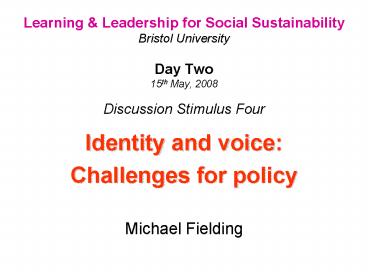Learning PowerPoint PPT Presentation
1 / 19
Title: Learning
1
Learning Leadership for Social
SustainabilityBristol UniversityDay Two15th
May, 2008
- Discussion Stimulus Four
- Identity and voice
- Challenges for policy
- Michael Fielding
2
Puzzles about personalisation (1)
- 1 Ahistorical - prisoners of the present
- 2 Superficial - no intellectual hinterland /
unexamined demands of 21st C - 3 Insular - legitimises timidity
- 4 Individualistic - marginalises common good
- 5 Hyperbolic - transformation, intention over
substance - 6 Misleading - re-branding contested practices
- 7 Technicist what works marginalises
purposes values - 8 Episodic atomistic, no sense of
sustainable self
3
Puzzles about personalisation (2)
- 9 Calibrated - spurious measurement
marginalises emergent exploratory - 10 Dishonestly vacant means what you want it to
/ populist / covert filter - Above all else there is
- ? no coherent or compelling account of how we
become persons - ? no way of distinguishing between new forms of
exploitation / intensification and approaches
that are genuinely concerned for the whole person
4
The Functional the Personal
- They are opposites with a tension between them
- They are inseparable and limit one another
- They are essential to one another and form a
unity - Any attempt to fuse them or absorb one into the
other will fail because they are opposites - Any attempt to separate them will fail because
they limit one another - Any effort to run them parallel with one another
without relating them will break down because
they form an essential unity
5
The Proper Relation between the Functional and
the Personal
- The functional is for the sake of the personal
- The functional is
- transformed by / expressive of
- the personal
6
Organisational Communal Orientation of Schools
7
A sense of sustainable self?
- How can a human being develop a narrative of
identity and life history in a society composed
of episodes and fragments? - Short term capitalism threatens to corrode
character, particularly those qualities of
character that bind human beings to one another
and furnishes each with a sense of sustainable
self - Richard Sennett The Corrosion of Character The
Personal Consequences of Work in the New
Capitalism (1998) 26,27
8
The necessity of narrative
- Students
- Diaries journals (paper digital)
- Negotiated / co-constructed curriculum
- Self-managed learning groups
- Small support groups (counter-publics)
- The arts
- Staff
- Action learning sets
- Pairings / critical friendships
- Shared
- Trips / residentials / new traditions (sbor!)
- New, multi-vocal public spaces e.g. from students
in staff meetings to Blooms school council - Bishops Park College Research Forum
9
The Role of the Teacher (1)
- For a pupil to direct his own learning
successfully he also needs close and systematic
help and guidance from teachers who know him well
his interests, attitudes, values, abilities and
quirks and whom he knows equally well. And that
suggests teachers who know him and work with him
not simply as a student of literature or
mathematics, but in a much more open context
generalists rather than specialists.
10
The Role of the Teacher (2)
- Wherever education assumes autonomy of the
student, the tutorial role becomes the teachers
central part in the education of his students.
But the tutorial role cannot be seen as that of
some sort of educational consultant. In order to
be equipped to offer sustained and systematic
guidance to his pupils a teacher needs to know
them, as students and as people, and in order to
know them he needs to study with them as well as
talk to them and observe them (MF italics) - Source The Role of the Teacher Michael
Armstrong (1973)
11
It is the manner of giving that counts
- Giving the aged poor their pension and
providing them with medical care may be a
necessary condition for their self respect and
dignity, but it is not a sufficient condition. - It is the manner of giving that counts and
the moral basis on which it is given whether
strangers at my door get their stories listened
to by their social worker, whether the ambulance
man takes care not to jostle them when they are
taken down the steep stairs of their apartment
building, whether a nurse sits with them in the
hospital when they are frightened and alone. - Respect and dignity are conferred by gestures
such as these. They are gestures too much a
matter of human art to be made a consistent
matter of administrative routine. - Source The Needs of Strangers Michael
Ignatieff (Chatto Windus 1984)
12
Dialectic of the personal
- 1. Expressive dimension
- Care intensifies the functional
- Transformative bridge
- Skills as expressions of care
- Responsive dimension
- Care heightened expertise elicits response
- Bond of mutuality
- Wont let teacher down / pride in skill etc
- Dialogic dimension
- Mutual learning between teacher student
- Education as transformative community
- Positive human agency shared hope for future
13
5 perspectives on education
14
Radical change?
- Reform is radical when it addresses and changes
the basic arrangements of a society its
formative structure of institutions and enacted
beliefs - Roberto Unger
15
Creative Renewal or Radical Change?
16
3 approaches to student voice (1)
17
3 approaches to student voice (2)
18
From audience to author, from data to dialogue
(1)how adults listen to and learn with students
in schools
19
From audience to author, from data to dialogue
(2)how adults listen to and learn with students
in schools

